Meridonian Navy: Difference between revisions
No edit summary |
No edit summary |
||
| Line 216: | Line 216: | ||
*[[Meridon Defense Forces]] | *[[Meridon Defense Forces]] | ||
*[[Modern equipment of the Meridonian Navy]] | *[[Modern equipment of the Meridonian Navy]] | ||
{{Template: | {{Template:MeridonTopics}} | ||
{{MeridonDefenseForce}} | {{MeridonDefenseForce}} | ||
[[Category:Meridon]] | [[Category:Meridon]] | ||
[[Category:Meridonian military]] | [[Category:Meridonian military]] | ||
Revision as of 13:12, 4 February 2023
| Meridonian Navy | |
|---|---|
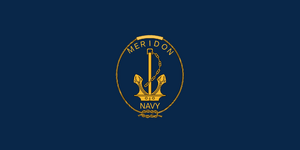 Service flag of the Meridonian Navy | |
| Active | 06 May 1739 - present |
| Country | |
| Type | Navy |
| Role | Naval warfare |
| Size | 181,382 |
| Part of | |
| Ceremonial Garrison | MNS Pierra Bay, Port Sistine |
| Motto(s) | From the Seas, Strength |
| Colors | Naval Blue, Guidon Gold |
| March | TBD |
| Engagements | Second Meridonian Civil War |
| Commanders | |
| Commander-in-Chief | William Acton |
| Defense Secretary | Jason Merritt |
| Navy Secretary | Mary Woolworth |
| Chief of Defense Staff | Gen John Argus |
| Chief of Navy Staff | ADM Stephen Harford |
| Vice Chief of Navy Staff | VADM William McArmors |
| Naval Executive Warrant Officer | WOC1 Pierre Laforde |
| Insignia | |
| Service badge |  |
| Aircraft roundel |  |
| Alternate low-vis roundel |  |
The Meridonian Navy is the naval warfare component of the Meridon Defense Forces. It is composed of 181,328 active duty sailors, and about 24,000 reservists as of 2022. It operates a number of aircraft and a number of naval vessels, making it the number largest navy in the world.
The Navy traces its origins to the merchant fleets and city-state merchant marines of early colonial Meridon through various means. The Meridonian Navy was formally organized in 1739 alongside the Army by the Union Council in order to help fight in the Second Meridonian Civil War. It regularly participated in punitive and policing actions throughout the 1800s, and played a part in the Second Escar-Varunan War. The Navy, along with the Army, existed as independent forces without a real unified command structure until 1833, where it was subordinated under the War Office alongside the Navy. A need for greater joint forces command, realized during the Second World War, resulted in the restructuring of the armed forces and the establishment of the Meridonian Defense Forces and the Defense Department.
The Navy in the modern day is a fully professional service arm. Alongside the Army, it utilized mandatory conscription enacted in Meridon from 1934 to 1960 to meet manpower needs, however, it has been able to maintain numbers through volunteers alone since 1960. Today, the Navy is a blue-water, expeditionary-capable fighting force that fields a mix of warships including fixed-wing and helicopter carriers, submarines, guided missile destroyers and frigates, and a number of other support vessels. The Navy is administered by the Department of the Navy as a civilian oversight, however it is commanded by the Chief of Navy Staff, an admiral and the seniormost commissioned officer in the Navy. It regularly conducts operations and exercises along other nations and is able to project power globally in the pursuit of national interests.
History
Early Iterations
Formation
1800's
Early 1900's
2nd Escar-Varunan War
Post-war
Modern day
Organization
The Navy consists of two components- Regular and Fleet Reserve. Regular formations compose the active-duty formations of the Navy and comprise the majority of its strength, including all of its major surface combatants. Reserve formations consist of both part time sailors and lower readiness formations and units that are generally relegated to defense support activities on an as-needed basis. Reserve sailors, at a minimum, conduct training two days per month with their formation and two weeks of annual training a year.
The Navy is headed by the Chief of Navy Staff, the highest-ranking commissioned officer in the Navy, who sits on the Defense General Staff as its seniormost representative. The CONS reports to the Navy Secretary, who reports to the Defense Secretary, who primarily advises the President of Meridon on all defense matters and is responsible for implementing civilian policy into the Navy.
Structure
See also: List of units of the Meridonian Navy All naval operating forces, active and reserve, are operated under Naval Fleet Command (NFC), which operates, equips, organizes and administrates all Naval ships. NFC is organized into 3 operating fleets. 1 Fleet (also known as Home Fleet) operates forces intended for defensive operations and operations in the vicinity of the Meridonian archipelago. 2 Fleet operates forces designated to conduct expeditionary warfare as needed. 3 Fleet operates all reserve, support, and auxiliary vessels.
Naval Support Command (NSC) organizes all non-operational or administrative functions of the Navy. Naval special forces are organized under the Naval Special Forces Group (NSFG), which is subordinated to the Meridon Joint Special Operations Command, a tri-service organization of special forces units.
Headquarters, Navy
- Naval Support Command (NSC)
- Naval Education and Training Command (NETCOM)
- Federal Navy Academy
- Naval Recruit Training Center Kaharoa
- Naval Sea Warfare Center
- Naval Aerospace Warfare Center
- Naval Bureau of Medicine and Surgery (BUMED)
- Naval Systems and Acquisition Command (NSACOM)
- Naval Bureau of Personnel (BUPERN)
- Naval Investigative Service (NIS)
- Naval Bureau of Legal Affairs (BULEG)
- Naval Cyberwarfare and Intelligence Group (CIGRUP)
- Naval Engineering Command (ENGCOM)
- Naval Air Command (NAVAIR)
- Naval Education and Training Command (NETCOM)
- Naval Special Forces Group (NSFG)
Regiment Marines Commando
Main article: Regiment Marines Commando
The Regiment Marines Commando is a semi-separate organizational branch of the Navy that serves as Meridon's elite amphibious rapid reaction force. While in some respects it is organized and normally operates as a separate branch, the Marine Regimental Commander reports to the Chief of Navy Staff.
Special operations forces
See also:Special Operations Forces Command
Special warfare forces are organized under the Naval Special Forces Group (NSFG), which regularly interoperates and reports to Special Operations Forces Command (SOFCOM). NSFG consists of a number of tenant special forces unit.
Equipment
See also:Modern equipment of the Meridonian Navy
Uniforms
Personnel
See also:Military ranks of the Meridon Defense Forces#Meridonian Navy
Commissioned officers
| DD Pay Grade | OF11 | OF10 | OF9 | OF8 | OF7 | OF6 | OF5 | OF4 | OF3 | OF2 | OF1 | OFC |
|---|---|---|---|---|---|---|---|---|---|---|---|---|
Navy |
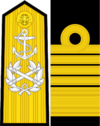
|
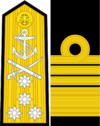
|
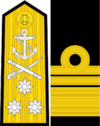
|
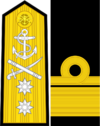
|
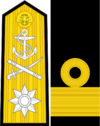
|
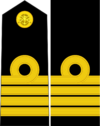
|
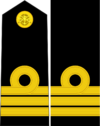
|
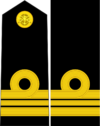
|
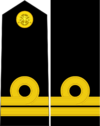
|

|
Various | |
| Rank title | Fleet Admiral | Admiral | Vice Admiral | Rear Admiral | Commodore | Captain | Commander | Lieutenant Commander | Lieutenant | Not used | Sublieutenant | Various |
| Abbrevation | FADM | ADM | VADM | RADM | CDRE | CAPT | CDR | LCDR | LT | SBLT | Various |
Other ranks
| DD Pay Grade | WO1 | WO2 | WO3 | WO4 | WO5 | OR6 | OR5 | OR4 | OR3 | OR2 | OR1 | Recruit | |
|---|---|---|---|---|---|---|---|---|---|---|---|---|---|
Navy |

|

|

|

|

|

|

|

|
No rank insignia | ||||
| Rank title | Warrant Officer Class 1 | Warrant Officer Class 2 | Not used | Not used | Not used | Chief Petty Officer | Leading Petty Officer | Petty Officer | Leading Rate | Senior Rate | Able Rate | Seaman Recruit | |
| Abbrevation | WOC1 | WOC2 | CPO | LPO | PO | LR | SR | AR | SmR |





